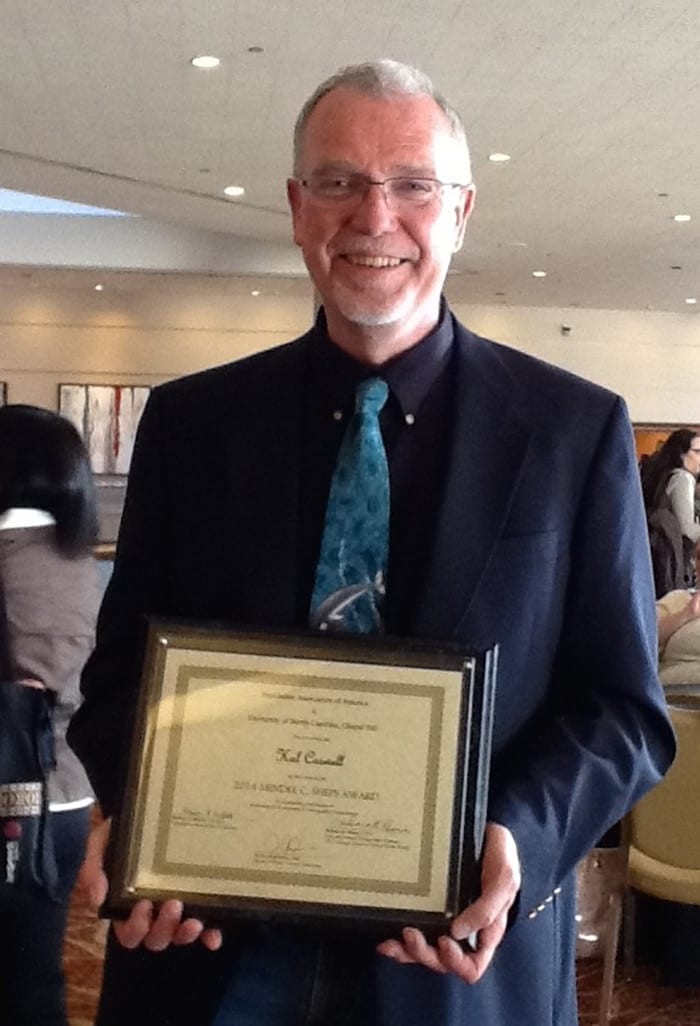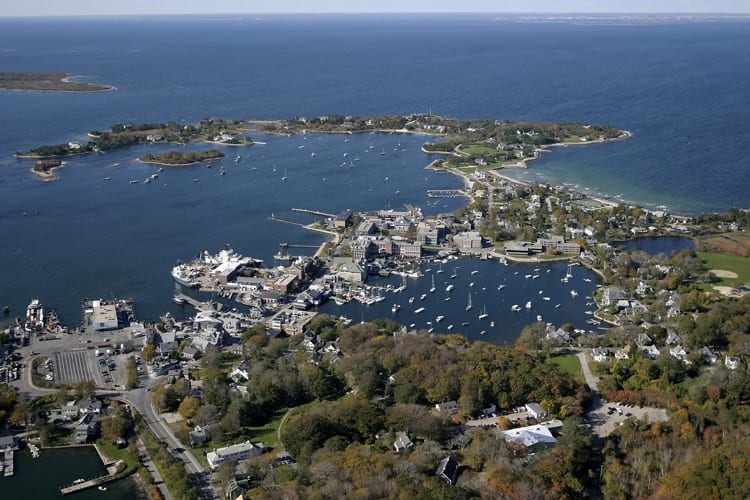News Releases
Newly Discovered Juvenile Whale Shark Aggregation in Red Sea
Whale sharks (Rhincodon typus)—which grow more than 30 feet long—are the largest fish in the world’s ocean, but little is known about their movements on a daily basis or over years. A newly discovered juvenile whale shark aggregation off Saudi Arabia is giving researchers a rare glimpse into the lives of these gentle giants.
Read MoreDispersant from Deepwater Horizon Spill Found to Persist in the Environment
A new study by scientists at Haverford College and Woods Hole Oceanographic Institution (WHOI) has found that the dispersant compound DOSS, which decreases the size of oil droplets and hampers the formation of large oil slicks, remains associated with oil and can persist in the environment for up to four years.
Read More“Science Made Public” Lecture Series Celebrates Alvin’s 50th Year
This summer, Woods Hole Oceanographic Institution’s “Science Made Public” series celebrates the deep-diving submersible Alvin’s 50 years in operation. A venerable giant in deep ocean research, Alvin has logged many accomplishments…
Read MoreJames Bellingham Appointed Director of WHOI Center for Marine Robotics
The Woods Hole Oceanographic Institution has appointed James Bellingham as the first director of its Center for Marine Robotics. Bellingham will come to WHOI in early fall 2014 from the…
Read MoreTags Reveal Chilean Devil Rays Are Among Ocean’s Deepest Divers
Mainly thought to be surface dwellers, Chilean devil rays (Mobula tarapacana) are most often seen gliding through shallow, warm waters. But a new study by scientists at Woods Hole Oceanographic Institution (WHOI) and international colleagues reveals that these large and majestic creatures are actually among the deepest-diving ocean animals.
Read MoreStudy Finds Emperor Penguin in Peril
An international team of scientists studying Emperor penguin populations across Antarctica finds the iconic animals in danger of dramatic declines by the end of the century due to climate change.…
Read MoreUnderstanding the Ocean’s Role in Greenland Glacier Melt
The Greenland Ice Sheet is a 1.7 million-square-kilometer, 2-mile thick layer of ice that covers Greenland. Its fate is inextricably linked to our global climate system. In the last 40…
Read MoreClimate Change Winners and Losers
The Antarctic Peninsula, the northern most region of Antarctica, is experiencing some of the most dramatic changes due to climate warming, including population declines of some penguin species. This is…
Read MoreIconic Research Submersible Alvin Turns 50
We know more about the surface of other planets than we do about Earth’s ocean. And what is known about our ocean would not have been possible without the deep-sea…
Read MoreHow Do Phytoplankton Survive Scarcity of a Critical Nutrient?
Phytoplankton—tiny, photosynthetic organisms—are essential to life on Earth, supplying us with roughly half the oxygen we breathe. Like all other life forms, phytoplankton require the element phosphorus to carry out…
Read MoreWHOI Scientist Collaborates with Falmouth High School Art Students
Woods Hole Oceanographic Institution (WHOI) biologist Dr. Rebecca Gast and Falmouth (Mass.) High School art teacher Jane Baker have teamed up to bring the excitement of polar research to Falmouth…
Read MoreCaswell Selected for Mindel C. Sheps Award
The Population Association of America (PAA) selected biologist Hal Caswell of the Woods Hole Oceanographic Institution (WHOI) to receive the 2014 Mindel C. Sheps Award for his contributions to mathematical demography. The PAA is the major professional society devoted to the study of human populations. The prestigious honor is awarded to one scientist biennially on the basis of important contributions to knowledge either in the form of a single piece of work or a continuing record of high achievement.
Read MoreScientists Test Hearing in Bristol Bay Beluga Whale Population
The ocean is an increasingly industrialized space. Shipping, fishing, and recreational vessels, oil and gas exploration and other human activities all increase noise levels in the ocean and make it…
Read MoreRobotic Deep-sea Vehicle Lost on Dive to 6-Mile Depth
On Saturday, May 10, 2014, at 2 p.m. local time (10 pm Friday EDT), the hybrid remotely operated vehicle Nereus was confirmed lost at 9,990 meters (6.2 miles) depth in the Kermadec Trench northeast of New Zealand. The unmanned vehicle was working as part of a mission to explore the ocean’s hadal region from 6,000 to nearly 11,000 meters when a portion of it likely imploded.
Read More
New Sensor Array to Monitor Impacts of Changing Gulf of Maine Conditions on New England Red Tide
Scientists from the Woods Hole Oceanographic Institution (WHOI) are kicking off an innovative NOAA-funded pilot program using robotic instruments and computer modeling analysis to shed light on changing ocean conditions in the Gulf of Maine as they relate to the harmful algal bloom (HAB) phenomenon commonly known as the New England red tide.
Read MoreWHOI Hosts Public Forum and Art Exhibit on Impacts of Climate Change to Polar Animals
No place on the planet is more vulnerable to climate change than the polar regions of the Arctic and the Antarctic. Warming waters and the loss of sea ice are…
Read MoreWHOI Awarded Top Rating among Charities
Woods Hole Oceanographic Institution (WHOI) has received the highest rating for sound fiscal management, accountability, and transparency by Charity Navigator, the nation’s largest charity evaluator. WHOI has earned the highest…
Read MoreScientific Mission Will Explore One of the Deepest Ocean Trenches
An international team of researchers led by deep-sea biologist Tim Shank of the Woods Hole Oceanographic Institution (WHOI) will use the world’s only full-ocean depth, hybrid remotely operated vehicle, Nereus, and other advanced technology to explore life in the depths of the Kermadec Trench.
Read MoreStudy Tests Theory that Life Originated at Deep Sea Vents
One of the greatest mysteries facing humans is how life originated on Earth. Scientists have determined approximately when life began (roughly 3.8 billion years ago), but there is still intense debate about exactly how life began. One possibility – that simple metabolic reactions emerged near ancient seafloor hot springs, enabling the leap from a non-living to a living world – has grown in popularity in the last two decades.
Recent research by geochemists Eoghan Reeves, Jeff Seewald, and Jill McDermott at Woods Hole Oceanographic Institution (WHOI) is the first to test a fundamental assumption of this ‘metabolism first’ hypothesis, and finds that it may not have been as easy as previously assumed. Instead, their findings could provide a focus for the search for life on other planets. The work is published in Proceedings of the National Academy of Science.
Read MoreNewly Upgraded Alvin Sub Passes Scientific Sea Trials
Scientists gave the rebuilt Alvin submarine two thumbs up after field-testing the nation’s only human-occupied deep-sea research vehicle for the first time after a major $42-million overhaul that dramatically upgraded the sub’s capabilities.
Read MoreScientists Identify Core Skin Bacterial Community in Humpback Whales
In a paper published in the open access journal PLOS ONE, researchers at Woods Hole Oceanographic Institution (WHOI) and colleagues identified a core skin bacterial community that humpback whales share across populations, which could point to a way to assess the overall health of these endangered marine mammals.
Read MoreEnhancing Fisheries Science and Education in the Northeastern U.S.
Under a National Oceanic and Atmospheric Administration program called Quantitative Ecology and Socioeconomics Training (QUEST), the new partnership will focus on teaching and advising in a graduate fisheries program and developing new technologies to improve assessment and management capabilities.
Read MoreNew Research Shows Elevated Mercury from in-Ground Wastewater Disposal
As towns across Cape Cod struggle with problems stemming from septic systems, a recent study by a Woods Hole Oceanographic Institution (WHOI) scientist focuses on one specific toxic by-product: mercury.…
Read MoreChris Land Joins WHOI as General Counsel and VP for Legal Affairs
The Woods Hole Oceanographic Institution (WHOI) has appointed Christopher Land to be its General Counsel and Vice President for Legal Affairs. Land assumes his post on March 3. As…
Read More

